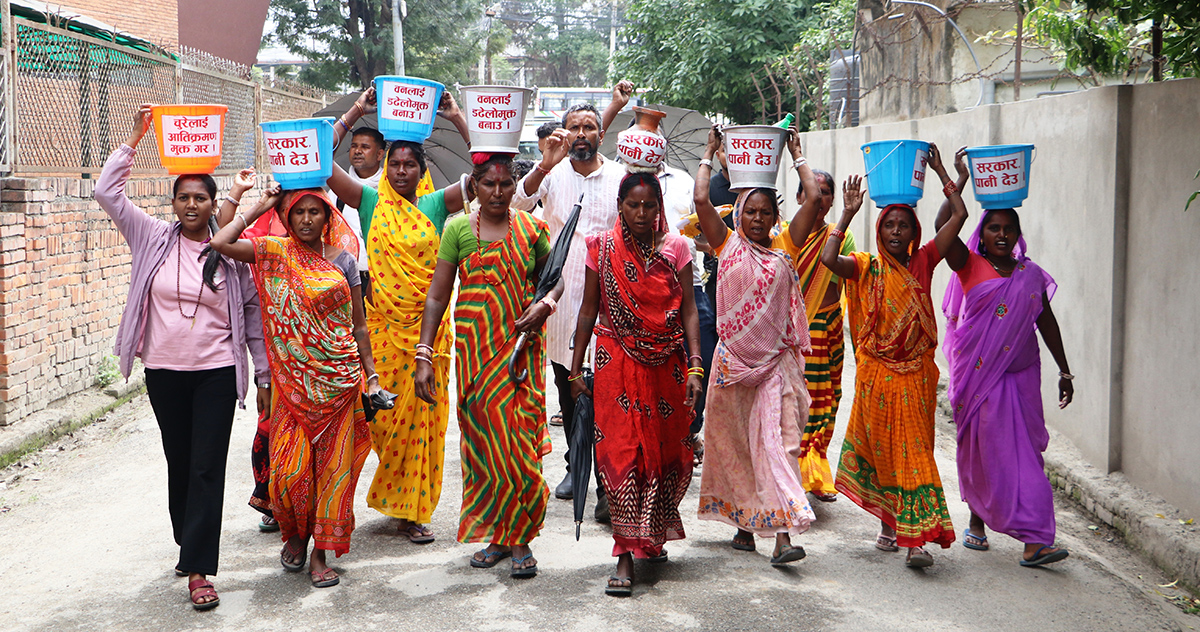For almost a week, a group of Nepalese citizens has been in the capital, Kathmandu, protesting the exploitation of the areas traversed by the Chure chain—a mountainous region on the border with India where natural water sources are drying up due to decades of uncontrolled sand extraction from riverbeds.
The protesters, 22 in total, walked for 25 days from the southern province of Madhesh carrying empty buckets inscribed with slogans: “Government, give us water,” “Save the trees for water,” and “Stop the Chure invasion.” They have vowed not to leave until the government addresses their demands.
However, Kathmandu has yet to initiate a dialogue with the demonstrators, among whom is Sabita Kumari Mahato, the younger sister of Dilip Kumar Maharo, an environmentalist who was killed four years ago for protesting against illegal mining activities.
Mahato told local media that despite the personal tragedy her family has endured, the fight to conserve the Chure Range now concerns the entire region and soon, the entire nation. “We can’t survive without water, no one can,” she said. “So why does the government do almost nothing about it?”
In some villages, natural water sources—also used for agriculture—have already dried up completely, forcing local inhabitants to wait for government-supplied water tanks. “At this rate, if the government does nothing, we will soon have to import water too,” Mahato commented.
A parliamentary session on the budget opened on Tuesday, May 28, and the environmental group hoped the government would allocate more funds for reforestation and water conservation than it did in last year’s budget. This did not happen: the government made no changes to existing projects.
Chure has been recognized as a protected area since 2014, the year the Presidential Council for the conservation of the region was established, which also includes the Tarai plains, often referred to as the breadbasket of Nepal because most of the country’s cereal production comes from there.
However, some studies suggest that the government’s efforts have been futile: on one hand, the creation of ponds and irrigation channels has been too slow compared to the pace of mining and deforestation; on the other hand, experts emphasize that an independent fund with full authority is needed to address various environmental issues effectively.
Sunil Yadav, coordinator of the Chure and Forest Conservation Committee and leader of the protest campaign, remarked it was shameful that locals had to rely on tankers for their daily water needs.
“The Tarai is lauded as the breadbasket of the country, but in the years to come, there won’t be much to see because everything is slowly drying up,” he said. “The effects of global warming are visible everywhere: in the Tarai, in the hills, and in the mountains. Soon the degradation of Chure will affect the entire nation, so where will the cereals come from?”
“Our ancestors never had to endure such a harrowing journey for water. I can’t imagine what’s in store for future generations,” said Sangita Devi Sada, who joined the campaign because the rivers in her village stopped flowing during the dry season for two years. “My feet are covered in blisters; I can barely walk. Who will I share this suffering with?”
“The Kamala River, which usually flows year-round, has started to dry up,” echoed Sonabatti Mukhiya, 70. “It’s becoming unrecognizable. They bring trucks and excavators at night to extract sand and boulders. The police just watch. They are all in collusion. If this is not stopped, the Kamala River will soon vanish without a trace.”
The group, including Sabita, Sunil, Sangita, Sonabatti, and others who marched to Kathmandu, has made 12 requests to the government. These include the creation of a law to protect the mountain range, a ban on sand extraction from riverbeds and construction in the name of development, and an investigation into activities in forests, where extraction is often illegal.







